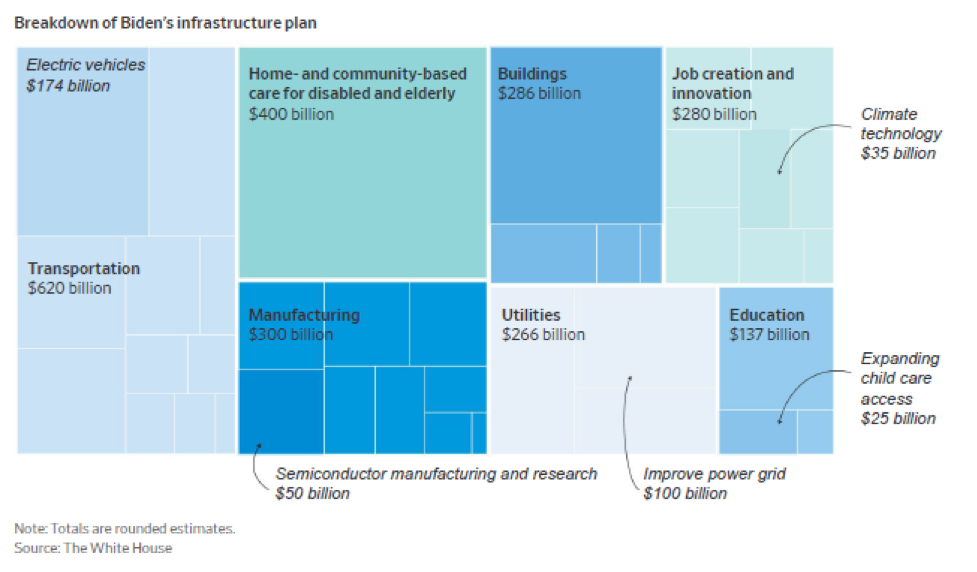Biden’s infrastructure plan: Why it can work
The United States badly needs massive improvements to its infrastructure and President Biden is putting forth legislation to do so. Why it is wide in scope, perhaps this time an infrastructure bill can actually become reality.

Past presidents have talked about an infrastructure plan to help rebuild the nation’s highways, bridges, dams, airports, and water systems. But these past presidents have not been successful in putting such plans into reality. President Biden faces severe challenges in getting such a plan through Congress at a time when the United States really needs the help. According to a report produced in 2019 from the World Economic Forum, the United States ranks 13th globally in overall infrastructure. For a nation with the largest gross domestic product (GDP), this is a sad predicament.
President Biden knows that bold action must be taken and accomplished with conviction and determination. “It is not a plan that tinkers around the edges. It is a once-in-a-generation investment in America,” President Biden stated in April. It is a wide-ranging plan that is aggressive and goes beyond past infrastructure proposals to fix and rehabilitate the nation’s roads, bridges, tunnels, and railroads. The bill is designed to improve wages, internet service, drinking water, as well as commute times. President Biden recognizes the urgency in getting the plan through Congress and making an idea into a hard reality: “We have to move now. I’m convinced that if we act now, in 50 years people will look back and say, ‘This was the moment America won the future.’” While Biden’s plan is aggressive and far-sighted, controversy arises as to how such an infrastructure plan will be paid for and who will foot the bill.
What the plan entails
President Biden’s infrastructure plan is very broad, ambitious, and far ranging in which it is ultimately aimed at reviving and overhauling the American economy. The price tag for such a program is estimated to be $4 trillion over a period of ten years and has been named the “American Jobs Plan”. Among the programs in the plan are:
Transportation infrastructure: The plan seeks to modernize and improve at least 20,000 miles of highways, bridges, roads, railroads, and airports. This is estimated to cost in the neighborhood of $621 billion which some regard as old-fashioned but sorely needed improvements. For example, there are rail tunnels connecting New York City to New Jersey that are 111-years-old that have suffered serious deterioration since being flooded with salt water as a result of Hurricane Sandy in 2012. There is the Brent Spence Bridge that crosses the Ohio River between Cincinnati, Ohio and Covington, Kentucky that not only needs repair but many have called for its replacement at a cost of $2.5 billion. Biden’s plan also calls for repairing the worst of 10,000 smaller bridges as well as replacing thousands of buses, renew and revitalize airports, and expanding transit and rail services into towns, boroughs, and various communities that have no such service.
Electric grid and clean energy: The nation’s electric grid is desperately in need of an upgrade which is evidenced by recent failures in both Texas and California. The plan calls for putting $100 billion into the nation’s power infrastructure in which there would be the installation of high voltage transmission lines in order to improve and upgrade existing systems and interconnect regional grids. The plan will mean expenditures toward new and modern power lines, employing hundreds of workers to carry out the project, and reducing the chances of power outages such as what occurred in Texas due to the unexpected snow storm earlier in 2021. The President’s plan also includes creating incentives for clean energy which includes renewable and low-to-no emission sources of power. The plan also calls for energy storage using existing tax credits and clean energy grants made available to state, local, and tribal governments. The goal is to emphasize and advance cutting-edge technologies that can help contribute to achieving the Biden Administration’s goals of reducing emissions. The plan also includes capping orphan oil and gas wells and clean up abandoned mines such as coal, uranium, and other hard-rock sources, which are often in rural areas, that are safety and environmental risks.
Broadband coverage: President Biden’s plan is ambitious in that it calls for constructing high-speed broadband infrastructure that will reach 100 percent of coverage throughout the United States. The plan also calls for brining affordable and reliable internet access to all especially “the more than 35 percent of rural Americans who lack access to broadband at minimally acceptable speeds.” The plan wants to promote price transparency and incite competition between internet providers while at the same time help lower broadband cost through competitive, efficient, effective, and widespread service. This is a very important step in creating internet access to all Americans so that there would be a level playing field in terms of employment and educational opportunities. Through this plan, individuals in rural, suburban, and urban areas would have equal, high-speed access to broadband service at a fair and competitive price. While the price tag for this aspect of the American Jobs Plan is estimated to be $100 billion, the plan calls for “support for broadband networks owned, operated by, or affiliated with local governments, nonprofits, and co-operatives” and places an added emphasis on expanding into tribal communities.
Drinking water: If there is one serious problem facing the United States today, it is the lack of clean drinking water in many communities. The situation in Flint, Michigan is only a small part of the problem in which other cities, such as Newark, New Jersey is also having problems with their water supply containing lead and other containments. President Biden’s plan calls for an aggressive elimination of 100 percent of lead pipes across the United States by providing $45 billion for pipe replacement and service lines. The plan also wants to improve and modernize the nation’s drinking water system, wastewater, and stormwater systems. The plan goes even farther by attempting to bring down contaminants in water while also improve rural clean water infrastructure throughout the United States at a cost of $66 billion. This is an aspect of President Biden’s plan that many engineers, scientists, and policymakers feel is necessary and long overdue.
Housing: This is one aspect of President’s infrastructure that many critics feel is going beyond the norm of such a program. Usually, infrastructure plans deal with roads, bridges, tunnels, dams, and airports. But the President’s plan will include $213 billion for housing. As Biden has stated, this money is necessary in order to “produce, preserve, and retrofit more than two million affordable and sustainable places to live.” The plan also includes tax credits of $40 billion in order to rehabilitate or build half-a-million low-and middle-class homes as well as improving the public housing system infrastructure. The idea is to expand the nation’s number of affordable housing while also spurring on the housing construction industry as well as creating new jobs.
These are only a few of the programs and proposals the Biden Administration is putting forth. But a key question is: How to pay for it all?
How much will it cost?
Like any government plan or proposal, an important element is the cost. It is projected that just the infrastructure part of the American Jobs Plan will cost $2.3 trillion over eight years. In order to pay for the program, the legislation is calling for the corporate tax rate to increase from 21 percent to 28 percent over 15 years. The program is also to be funded by an increase in taxes on foreign earnings for companies in which they would restructure or flat out replace much of the international tax programs established under the Trump Administration. These sources of funding would come from multinational corporations which earn substantial profits as well as book them from overseas ventures and subsidiaries. These are moneys that would probably not find their way back to the United States if not for the proposed tax increase under the American Jobs Plan.
The plan would also prevent American corporations from having a claim on offshore tax havens as their place of business or headquarters. The plan goes even further by eliminating fossil fuel tax preferences, clamp down of tax enforcement through the addition of more employees at the Internal Revenue Service, and altering other corporate related taxes. There is also a plan by the Biden Administration to impose a 21 percent global minimum tax in which the funds received would go to pay for many of the infrastructure programs.
A long overdue infrastructure plan
Regardless of the cost, an infrastructure plan that would make needed improvements is desperately needed. The United States is falling far behind China and the European Union in improvements in infrastructure that, despite critics such as the Tax Foundation and Republicans in the House and Senate, would ultimately help the economy in the long term.
The nation’s bridges, dams, railroads, highways, and airports, to name a few aspects of the American infrastructure, are in serious need of being rebuilt or replaced. But it must be kept in mind that this is the 21st century and that infrastructure must also include internet broadband. It is sad that the rural parts of the United States have fallen far behind in access to the internet and the capability to achieve faster speed on the internet. Biden’s plan is also broader in scope by including provisions for more funding in research and development that is sorely needed in order to make contributions to American industry. Even if just basic research were to experience an increase in funding, then many aspects of American life, not just businesses and manufacturing, would see long-term benefits.
Putting money into the nation’s infrastructure is a key investment that will give it returns that far outweigh the costs. This has happened before in American history. For example, the building of the Erie Canal helped increase commerce when the United States was still quite young. Also, while Abraham Lincoln was trying to keep the nation together and fighting the South in a bloody Civil War, he gave the go ahead and funding for a Transcontinental Railroad that joined the east and west. These two examples should be kept in mind as to why the American Jobs Plan can succeed and ultimately pay long-term dividends.






